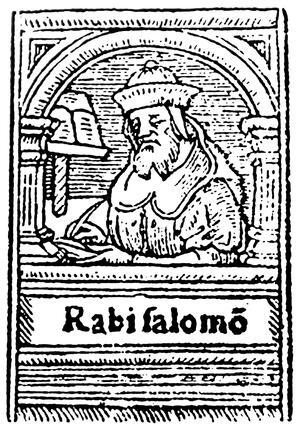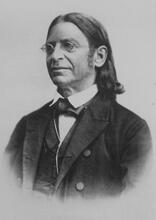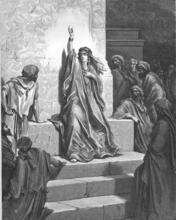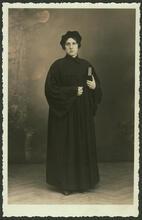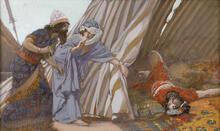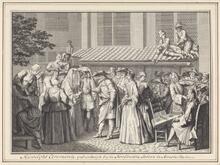Rashi
The medieval commentator Rashi, through his commentary and halakhic works, was an advocate for improving the status of women, introducing innovative exegesis to support his views. Though he held traditional views of modesty and women performing mitzvot, he wrote commentaries defending many of the women of the Bible against the misogynistic thrusts of his peers and wrote responsa that protected women from abuse under Jewish marriage law. His followers, the Tosafists, would continue to innovate and support Jewish women.
Rashi (Rabbi Solomon ben Isaac, 1040–1105) is considered the greatest Jewish scholar of medieval times in Ashkenaz (Germany, France and England). The accepted theory that he was conservative and reluctant to innovate in his rulings is incorrect. Rashi was endowed with great spiritual courage and willingness to differ from his teachers and from common prejudices, and to pave a new and independent path based on the one thing which was dominant in his spiritual world: the pursuit of truth. He stood by his opinions forcefully and assertively, never recanting them before his distinguished teachers or hesitating to engage those teachers in tough and turbulent arguments. Conservatism was as far from Rashi as east from west. Openness and the search for truth guided him in all he did.
These characteristics found their expression in Rashi’s attitude towards women. It is doubtful whether we can find another Jewish scholar active at the time who was willing to make changes for the benefit of women’s rights even where The legal corpus of Jewish laws and observances as prescribed in the Torah and interpreted by rabbinic authorities, beginning with those of the Mishnah and Talmud.halakhic and and Statements that are not Scripturally dependent and that pertain to ethics, traditions and actions of the Rabbis; the non-legal (non-halakhic) material of the Talmud.aggadic sources were not kindly disposed towards them. True, he sometimes accepted prejudicial opinions about women in the sources, but his relatively tolerant and considerate attitude towards women is worthy of note.
Women as “Godly Folk”
In Malachi 2:10–16, the people returning to Zion from exile are rebuked for neglecting their wives and marrying foreign women. It is there that the unique expression zera Elohim (literally, the seed of God) appears: “Because the Lord is a witness between you and the wife of your youth with whom you have broken faith, though she is your partner and covenanted spouse. Did not the One make [all], so that all remaining life-breath is His? And what does that One seek but godly folk [zera Elohim]? So be careful of your life-breath, and let no one break faith with the wife of his youth” (14–15). Regarding this, Rashi wrote: “‘Did not the One make [all]’—the Holy One, blessed be He, first made Adam and Eve … ‘And what does that One seek?’—that when one of the couple [the husband] unjustly seeks to accuse his wife of sin—his partner, she who is a godly folk. What does he demand, that he should thus scorn her?!”
These brief statements of Rashi evince a great appreciation of woman and of the institution of marriage. In his opinion, God created both Adam and Eve, and from that we derive that women are “godly folk,” with all this implies regarding the notion of women. Many medieval Jewish scholars interpreted this powerful expression as applying to male offspring, whom human beings desire and seek. The males are the “godly folk.” Rashi proposes another interpretation, determining that the woman is the “godly folk.” Indeed, many later editions emend Rashi’s text, writing “that he,” meaning the man, is “the godly folk.” Yet the manuscripts indicate that the wording “that she” is correct, and this is also evident from the context. Rashi does not explain the ideological rationale behind viewing the woman as the “godly folk,” but the context of his statements makes it clear that he believed it constituted a claim on the husband to treat his wife with fairness and respect.
Marriage as a Covenant
One of Rashi’s Halakhic decisions written by rabbinic authories in response to questions posed to them.responsa expresses his attitude toward the essence of marriage and the power of the connection and commitment it creates between husband and wife. As is usual for him, he does not give a theoretical and methodical lecture on his opinion, but integrates it in a The legal corpus of Jewish laws and observances as prescribed in the Torah and interpreted by rabbinic authorities, beginning with those of the Mishnah and Talmud.halakhic discussion on the husband’s duty to care for his wife’s honor even if she becomes ill after the marriage. He was asked about a husband who wished to divorce his wife without paying her the marriage contract on the grounds that at the time of marriage she hid the sores on her face with cosmetics, and thus the marriage was not binding, falling under the category of mekah ta’ut (a “bad bargain”). Since testimony that reached Rabbi Solomon ben Isaac; b. Troyes, France, 1040Rashi contradicted the husband’s version, Rashi ruled against him. Yet he did not content himself with a halakhic discussion and a decision in the wife’s favor, but responded sharply, using the opportunity to give the husband a lesson in ethics. He wrote, inter alia: “The husband has shown that his actions are evil and that he is no true descendant of our Father Abraham, whose way was to practice compassion towards humankind, and all the more so for his wife, who entered into a covenant with him. … [and if he behaves properly to his wife] he is blessed that he has merited her, since through her he acquires the World to Come. …”
Rashi’s statements show that he viewed marriage as a covenantal act. In Scripture, this concept carries great religious and emotional weight. God is witness to the fulfillment of this mutual covenant, and is even a partner in it. In Rashi’s opinion, Judaism obligates the husband not only to honor his wife, but also to live with her in love and fellowship, and great is the reward of anyone who thus behaves toward his wife.
There is something unique about Rashi’s ruling that if the husband behaves fairly toward his wife, “through her he acquires the World to Come.” This is a new idea not found in the A type of non-halakhic literary activitiy of the Rabbis for interpreting non-legal material according to special principles of interpretation (hermeneutical rules).Midrash, Lit. "teaching," "study," or "learning." A compilation of the commentary and discussions of the amora'im on the Mishnah. When not specified, "Talmud" refers to the Babylonian Talmud.Talmud or medieval Jewish commentaries. The Sages spoke of several questions that a man is asked in the Heavenly Court after his death, but do not include the question of how he treated his wife. It goes without saying that there is no textual support for Rashi’s opinion that a man acquires the World to Come by treating his wife well. It turns out that Rashi saw this as a direct consequence of the covenant formed between the couple, in which God also has a part. We can find the idea that the Shekhinah rests with the couple and that God is the third partner in their marriage bond in the statements of the sages. It seems that Rashi concluded from this covenant that each member of the couple who preserves the institution of marriage merits the blessing of the third “partner,” God, and whoever violates it will have to account for having done so in the future.
The Image of Women in Rashi’s Commentary on the Bible and Talmud
The following are some clear examples of Rashi’s concern for women’s honor and status in society to be found in many of his commentaries on the Bible and the Lit. "teaching," "study," or "learning." A compilation of the commentary and discussions of the amora'im on the Mishnah. When not specified, "Talmud" refers to the Babylonian Talmud.Talmud. The sin of Eve, who seduced Adam in Eden, gave women a negative image in the eyes of many philosophers, Jewish and Christian alike. The Christians described her as the symbol of the sinning woman, unlike the pure and untainted Mary. The Jewish sages held women responsible for man’s expulsion from the Garden of Eden and for the fact that he is compelled to work hard to support himself and his household, and even for his descent from the supreme spiritual heights he inhabited before the Fall. Medieval sages interpreted Genesis 3:16—“Yet your urge shall be for your husband, and he shall rule over you”—as grounds for a man’s right to control his wife. In accord with this verse, some described the new relationship between them as a wife’s servitude toward her husband. Unlike these sages, Rabbi Solomon ben Isaac; b. Troyes, France, 1040Rashi deprecated the importance of these texts; he restricted a wife’s punishment to one small area only, the husband’s additional right to sexual relations, and ruled out completely all the statements about mastery versus servitude and the husband’s general control over his wife. The written language of Genesis 3:16 contains no preference whatever for the interpretation he proposes. Rashi understood very well the power arising from the phrase “and he shall rule over you,” but sought to negate it in his commentaries and to limit considerably the husband’s control over his wife.
His interpretation of the account of the creation of man and woman in Genesis is similar. The midrashic account of creation contains many statements that reproach the woman, her creation from man’s rib serving as the basis for this negative attitude. Jewish biblical commentators in the Middle Ages appropriated this story and the anti-woman commentaries, exploiting them for their own purposes to prove woman’s inferior status. Man was created first, his body coming from the earth and his soul from God. Not only was woman created after man, but she was even crafted from his rib, proof that she was essentially subordinate. These ideas are common to all three monotheistic faiths. As noted, they are written in the A type of non-halakhic literary activitiy of the Rabbis for interpreting non-legal material according to special principles of interpretation (hermeneutical rules).midrash and are widespread in the writings of the medieval sages, as also in those of contemporary Christian scholars. No ideas of this sort can be found in Rashi’s commentaries on the creation story.
Rashi usually refrained from quoting midrashic accounts critical of women in his commentaries, quoting instead those that praise women. Most of these midrashic accounts were about difficult times for the Jewish people as slaves in Egypt or their wanderings in the desert. The women were the ones who preserved the Jewish people’s existence in Egypt and made efforts to continue bearing children despite the great risk of death looming over them even as the Egyptians cast their sons into the Nile. They donated their costliest jewelry to the Tabernacle and God considered their contributions the most precious.
Women’s great love for the Land of Israel saved them from the sin of the spies and its punishment. They, not their husbands, merited entering the land: “‘Among these there was not one of them’ (Numbers 26:64), but the judgment resulting from the incident of the spies was not enacted upon the women because “they held the Promised Land dear.” Rashi’s commentaries portray in a positive light most of the Jewish women who appear as heroines in the Bible, such as the four matriarchs, Jochebed, Miriam, Achsah the daughter of Caleb, Deborah, Hannah, the mother of Samson, Abigail, Ruth, and Esther.
The Modesty of Women
Modesty was the one central issue on which Rashi’s attitude towards women was negative. Here Rashi accepted the sages’ position, repeated throughout the Lit. "teaching," "study," or "learning." A compilation of the commentary and discussions of the amora'im on the Mishnah. When not specified, "Talmud" refers to the Babylonian Talmud.Talmud and the A type of non-halakhic literary activitiy of the Rabbis for interpreting non-legal material according to special principles of interpretation (hermeneutical rules).Midrash, that “women are light-headed” and easily tempted. Therefore, both husbands and society in general are obliged to be very strict regarding women’s modesty. We can find this idea in Rashi’s scriptural and Talmudic commentaries. For example, in the explanation of the punishment meted to the serpent after he entices Eve in the Garden of Eden, Rashi writes: “‘And I will set enmity’—the serpent’s sole intention was that Adam should die by eating it first and that it would then take Eve for itself, and so it came to speak to Eve first only because women are easily tempted and know how to tempt their husbands; therefore, I shall put enmity [between you and the woman].” It is not by chance that in his commentary on the rape of Dinah Rashi chose to quote the midrash in Bereshit Rabbah criticizing her for “going out to visit the daughters of the land,” since it was her going out that led to her rape.
Rashi took a similar position in his commentary on Ecclesiastes 7:28: “I have found only one human being in a thousand, and the one I found among so many was never a woman.” He comments: “I also searched for one who is pure among women and did not find her, since they are all light-headed,” so one must be strict about women’s modesty. Rashi continues (v. 29), citing a midrash that says that the first woman, Eve, brought misfortune into the world. True, Rashi’s statements here are based on the midrash, and Rashi acknowledges this in his writing, but he ignored the midrash of the sages when he pleased or chose the ones that best suited his aims. One cannot contend that here, Rashi’s commentary follows the plain meaning of the written text, since he often ignores the text’s plain meaning.
Yet we should not exaggerate the emphasis on modesty in Rashi’s doctrine and compare it to the restrictions that several Jewish sages in Moslem lands placed on women in order to preserve their modesty. Islamic tradition is exacting about women’s modesty, limiting their freedom of movement. Against this background we can understand the statements of Jewish sages in Moslem countries, praising women who shut themselves in their homes. Rashi’s philosophy does not contain anything similar to this. Despite his great concern for women’s modesty and his apprehensiveness regarding their “light-headedness,” his philosophy in no way restricts women’s freedom of movement. Concerning questions put to him about women who were closely connected to feudal lords and visited them in their homes, Rashi felt that this was common and taken for granted, without any reservations.
Rashi’s commentary on “Ma’aseh Beruryah” contains a remarkable case cited in the Talmud (Avodah Zarah 18b). It tells of how Rabbi Meir, Beruryah’s husband, cleverly ransomed his wife’s sister from captivity in a brothel, afterwards fleeing to Babylon for fear of Roman reprisal. Another reason is given for his flight: “the story of Beruryah.” There is no hint in the Talmud as to what happened with Beruryah that caused Rabbi Meir to flee from The Land of IsraelErez Israel to Babylon. Here Rashi comments:
One time, [Beruryah] mocked the sages’ statement that “women are light-headed.” To prove to her that the sages were correct, Rabbi Meir ordered one of his students to woo her until she lay with him. When she learned that it was a test and the matter was revealed, she hanged herself, and Rabbi Meir fled to Babylon in shame.
It would seem that this commentary reached Rashi from some interpretive tradition, but its source is unknown. In any case, Rabbi Nissim ben Jacob of North Africa (“Nissim Head of the Torah academies of Sura and Pumbedita in 6th to 11th c. Babylonia.Gaon,” c. 990–1062) had a different interpretation, according to which Rabbi Meir fled to Babylon together with his wife Beruryah, so we see that the source of the story Rashi relates is solely interpretive tradition. Our inability to discover his source and what he may have added to it makes it very difficult to use this particular commentary to characterize his treatment of women. In any case, Rashi received this interpretation from others, and it indicates nothing about his own attitude toward women.
The Relationship Between Husband and Wife
In several places, Rabbi Solomon ben Isaac; b. Troyes, France, 1040Rashi is asked about proper relations between husband and wife. He viewed marriage as a covenant involving not only the husband and wife but also God. This attitude had practical ramifications. In the Halakhic decisions written by rabbinic authories in response to questions posed to them.responsum mentioned above, Rashi demanded that the husband whose wife had become ill with sores on her face treat her “with compassion and honor.” Divorcing a wife because she was getting on in years and the husband wished to marry a younger woman was, for Rashi, a betrayal, even if the husband covered it up with various excuses.
A husband who treats his wife with suspicion and mistrust undermines the family unit. It is precisely the suspicion which arouses resentment and hostility toward the husband in the wife’s heart, which may cause her to deceive him. The Lit. "teaching," "study," or "learning." A compilation of the commentary and discussions of the amora'im on the Mishnah. When not specified, "Talmud" refers to the Babylonian Talmud.Talmud (Writ of (religious) divorceGittin 90a) tells of Pappus ben Judah (Lit. (from Aramaic teni) "to hand down orally," "study," "teach." A scholar quoted in the Mishnah or of the Mishnaic era, i.e., during the first two centuries of the Common Era. In the chain of tradition, they were followed by the amora'im.tanna, end of the first century and beginning of the second century c.e.), who was most concerned about his wife’s modesty and feared she would deceive him, to the point where he locked her inside the house whenever he went out. The Talmud describes Pappus’s act as an anomaly, but does not comment on its inherent risks. On the other hand, Rashi comments that not only is this an anomalous act, but that there is a risk in such behavior: “When he leaves his home to go to the market he locks the door on her so that she cannot talk to anyone. This is an improper act, causing hostility to come between them and leading her to deceive him.” Not only is locking the door useless; on the contrary, it causes the relationship to deteriorate to the point where the wife does deceive her husband. Trust and fairness in the couple’s relationship, not suspicion and overcaution, are the guarantee of mutual fidelity. Rashi’s statements are not vital to understanding the subject. They are an additional interpretation that reflects Rashi’s personality, written to teach people to refrain from being overly strict and suspicious, and thus undermining the family’s well-being.
Protecting the Childless Widow
We can learn of the importance of love and mutual appreciation between husband and wife from Rashi’s ruling that a childless widow must not be forced into Marriage between a widow whose husband died childless (the yevamah) and the brother of the deceased (the yavam or levir).yibbum (Marriage between a widow whose husband died childless (the yevamah) and the brother of the deceased (the yavam or levir).levirate marriage), and any reason she gives against it should be accepted and followed by halizah (the ceremony releasing her from yibbum). The A biblical or rabbinic commandment; also, a good deed.mitzvah of yibbum is indeed ancient and considered of great importance in The legal corpus of Jewish laws and observances as prescribed in the Torah and interpreted by rabbinic authorities, beginning with those of the Mishnah and Talmud.halakhic and midrashic literature, and even more in the doctrine of the medieval Jewish sages. Levirate marriage, common in eleventh- and twelfth-century Germany and France, was also accepted in Spain and other major Jewish communities at the time. A woman who refused levirate marriage with no weighty reason to support her refusal was considered rebellious and lost her economic rights. Rabbi Solomon ben Isaac; b. Troyes, France, 1040Rashi felt that if the woman refused levirate marriage, one could hold out a promise of payment to her brother-in-law in exchange for releasing her, with no need to keep the promise afterwards. If her brother-in-law persisted in his refusal, he could be compelled to release her. Rashi’s ruling was of great help to women. Contemporary sources show that in many cases brothers-in-law exploited women’s desire for halizah in order to extort money and valuables from them. Rashi’s ruling differed explicitly from accepted custom in eleventh-century Ashkenaz, which he knew very well from the time of his studies in Germany.
Rashi also took another major step on behalf of women. In the Lit. "teaching," "study," or "learning." A compilation of the commentary and discussions of the amora'im on the Mishnah. When not specified, "Talmud" refers to the Babylonian Talmud.Talmud, Rabbi Eleazar ben Azariah (first-second century c. e.) rules that if the brother-in-law of a childless widow has boils, she is not forced to marry him. Rashi expanded considerably on ben Azariah’s ruling, stating in his commentary that the man suffering from boils is only an example not only for men with defects, but “for any reason she gives.” Whatever her reason, if the woman refuses to enter into a levirate marriage the brother-in-law is compelled to release her and pay her the amount of her marriage settlement. Rashi’s main innovation is a double recognition: of a woman’s right to refuse levirate marriage and of the right to force the husband to divorce her and pay her the amount stipulated in her marriage contract.
Rashi’s position was a great innovation, and it was not for nothing that Jewish sages of the medieval and modern periods disagreed with it. According to the statements’ plain meaning in the issue raised in the Talmud, it is not by chance that Rav Sheshet (late third century and the first half of the fourth century c. e.) mentioned precisely the disease of boils as a reason to compel halizah. This is a serious, perhaps even contagious illness, a kind of leprosy or other severe skin disease, a clear example of a grave defect that could destroy family life. It is very difficult to use this disease as the basis for any claim or reason that a woman could cite to justify her refusal to enter a levirate marriage and compel her brother-in-law to perform halizah.
What prompted Rashi to rule this way? All the statements in his commentary on the Talmud are measured and deliberate. The early medieval sages felt that one should learn from every single one of his words, and it is inconceivable that they were referring only to the fluency of his language. He was very much aware of the great significance of his rulings, and chose to base them on the Talmud in order to give them more authority. Moreover, he does not usually quote halakhic rulings in his commentary on the Talmud. He did so particularly on matters which were of contemporary significance and on which the sages had divided opinions. Rabbi Levi ben Jacob Habib (the Ralbah, c. 1483–1545), one of the Spanish exiles and the greatest of the Jerusalem scholars at the beginning of the sixteenth century, felt that Rashi had suggested this ruling, which bears witness to his great consideration for women, for personal reasons—he only had daughters—but it is difficult to believe that such a detail of his private life was the reason for his ruling. It turns out that the reasons were the improvement in women’s status in Ashkenaz at that time and Rashi’s own compassion for the suffering of his fellow human beings. We should see the ruling in a broader perspective: the sources document how hard life was for women in Ashkenaz who were subject to levirate marriage. Women who wished to obtain halizah were subject to great difficulty, including extortion, and the leadership in Germany and France during the tenth and eleventh centuries was too weak to impose its authority on the men involved. These men refused to heed the community’s ruling and delayed the halizah ceremony for years, hoping to extort more money from the widow. Rashi was very much aware of this grave situation and came to the women’s rescue, ruling that any reason they gave justified compelling the brother-in-law to perform halizah and pay the full amount stipulated in the marriage contract.
Women’s Status in Observing Mitzvot
In Rashi’s time, the sages wavered a great deal on the question of women’s right to recite blessings over time-bound A biblical or rabbinic commandment; also, a good deed.mitzvot. The Lit. "teaching," "study," or "learning." A compilation of the commentary and discussions of the amora'im on the Mishnah. When not specified, "Talmud" refers to the Babylonian Talmud.Talmud rules that “women are exempt from all time-bound mitzvot,” referring to mitzvot whose observance is connected with a specific time. This rule prevented women from observing many prescriptive mitzvot and removed them from the community of those obligated to observe commandments that gave a special dimension to religious life, including putting on Phylacteriestefillin, reciting the Shema morning and evening, sitting in the Booth erected for residence during the holiday of Sukkot.sukkah, hearing the Ram's horn blown during the month before and the two days of Rosh Ha-Shanah, and at the conclusion of Yom Kippur. shofar and more. Jewish women in Germany and France fought for the right not only to observe these mitzvot voluntarily but also to recite the appropriate blessings over them despite The legal corpus of Jewish laws and observances as prescribed in the Torah and interpreted by rabbinic authorities, beginning with those of the Mishnah and Talmud.halakhic concern that these blessings might be in vain, since the women were reciting them over mitzvot they were not commanded to perform.
One of the reasons for this hesitation on the part of the eleventh- and twelfth-century sages was the lack of any single ancient and clear tradition on the issue. Therefore, they did not rely on the early sages’ precedents but rather on their own understanding of the relevant Talmudic subject. Rabbi Solomon ben Isaac; b. Troyes, France, 1040Rashi forbade women to recite the blessings. It is doubtful whether we can therefore maintain that Rashi’s opposition indicates his attitude toward women’s status in observing mitzvot. It is almost certain that he made this ruling not because of a basic attitude toward women’s status regarding mitzvot observance but because of his principle of ruling according to the The discussions and elaborations by the amora'im of Babylon on the Mishnah between early 3rd and late 5th c. C.E.; it is the foundation of Jewish Law and has halakhic supremacy over the Jerusalem Talmud.Babylonian Talmud, even rejecting earlier customs accepted in Ashkenaz. Since he ruled this way on other subjects, Rashi had to abide by the same principle regarding this issue.
Rashi’s usually supportive attitude toward women and his concern for their honor and interests are indicated by the great respect the sages accorded his daughters. The sources indicate that Rashi’s grandchildren, among whom were France’s greatest tosafists, continued his legacy and also showed great respect for women.
Agus, Irving Abraham. The Heroic Age of Franco-German Jewry. New York: Yeshiva University Press, 1969, 277–309.
Falk, Ze’ev W. Jewish Matrimonial Law in the Middle Ages. Oxford: 1966.
Grossman, Avraham. Pious and Rebellious–Jewish Women in Europe in the Middle Ages, trans. (English) by Jonathan Chipman. Waltham MA: Brandeis University Press, 2004.
Grossman, Avraham. The Early Sages of France (Hebrew). Jerusalem: Hebrew University, 1995, 121–253.

